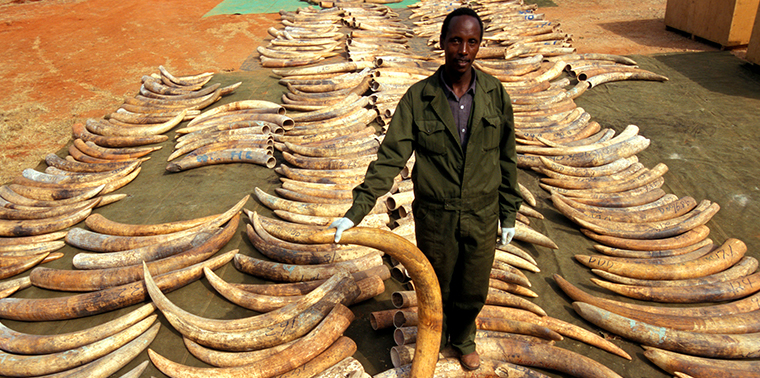August 28, 2017 — At over US$23 billion annually, the illegal trade in wildlife and wildlife body parts is the fourth most profitable illegal racket on Earth, topped only by drugs, weapons and human slavery. This fact has left conservationists looking for any instrument that can be enlisted in the fight against such trafficking — and many are increasingly turning to technology to help their efforts.
Last year, four contestants split the US$900,000 grand prize for the inaugural Wildlife Crime Tech Challenge, an international contest sponsored by USAID, the National Geographic Society, the Smithsonian Institution and TRAFFIC.
One prizewinner stood out for many observers, not so much for its technological inventiveness as for its broad application of the American legal system. The National Whistleblower Center, a Washington, D.C.–based nonprofit operating since 1988, offers advocacy and legal guidance to those seeking First Amendment protections for exposing wrongdoing. One of the Tech Challenge prizes went to the center, which used it to develop a novel department called the Global Wildlife Whistleblower Program, which launched in January 2017.
Center director Stephen Kohn says that although several U.S. statutes can be used to support those who — often at great personal risk — report the whereabouts of wildlife traffickers, they have not been applied in this way until recently. Not, in fact, until the summer of 2015, when the center realized that these powerful whistleblower laws could be used to protect wildlife.
“We were concerned that potential whistleblowers were unaware of these laws, and that there were no attorneys set up to represent wildlife whistleblowers,” says Kohn. So, because of its expertise in whistleblower laws and its familiarity with online strategies for ensuring anonymity, the center launched a new campaign to confront this dangerous area of global criminal activity.
Reward and Protection
Some of the strongest federal edicts against wildlife trafficking already contain judicial immunity protections and even rewards for whistleblowers. The Lacey Act of 1900 — revolutionary in its day for sharply restricting the rampant killing of birds, whose feathers served as adornments for the Gilded Age’s passion for feathered hats and later expanded to prohibit trade in animals and plants illegally taken, possessed, transported or sold — pays rewards to people who disclose information about wildlife crimes that results in successful prosecution. So does the Endangered Species Act, signed by Richard Nixon in 1973.
In a nutshell, the Global Wildlife Whistleblower Program works by applying existing regulatory frameworks prohibiting criminals from having any contact with American properties or businesses to prosecute those illegally shipping poached wildlife, using secure communications to protect informants from retaliation by poaching syndicates. The center publicizes the money to be made through successful prosecution of traffickers, safeguards the confidentiality of informants through digital encryption, and ensures that payments — sometimes in the multiple millions of dollars — are carefully transferred to those who have earned it. The reward can serve as a welcome deterrent for poor people who may be weighing a shot at wildlife crime themselves. “That’s the trick,” said Kohn. “Make it more profitable to turn in the violator than to participate.”
If American ships, planes, citizens or transport locales are involved in illegal wildlife trade activity, the Lacey Act and the Endangered Species Act allow for the seizure of contraband and the arrest of those participating in its transfer — meaning that U.S. law can be used to, say, nab a Vietnamese pangolin-scale smuggler on a Liberian freighter docked at a harbor in Singapore who has commercial ties to a Los Angeles importer. And with these statutes comes the considerable capacities of the FBI, the U.S. federal courts and other powerful American legal instruments.
“The only way to spread the word about these laws was to use technology to a create a web-based reporting structure that would permit whistleblowers from around the world to learn about these laws and file claims confidentially in the United States,” Kohn says.
The center uses free, open-source software known as SecureDrop, also used by investigative journalists, to ensure the security of data transmissions. By using code names, the app is able to gives whistleblowers anonymity as they exchange messages with center staff members.
Successful prosecutions generally result in monetary awards to informants, who are paid through secured electronic transactions. Each new bit of information is placed atop a SecureDrop case folder, which can include phone calls, documents, photographs, and audio or video recordings of criminal activity.
Disrupting the System
The center’s informants include rural villagers who know the routes and methods used by poachers and are often bribed or threatened to remain silent, as well as urbanites living near areas of trafficking such as shipping docks, airports and highway checkpoints. To report wildlife crime, people can use any internet connected device to access the fully secure submit a report page to the center. For those wanting additional security, there is another option to report the crime via Secure Drop, which uses a downloadable program ensuring anonymity. They can then submit information and relevant files like documents, audio, and video clips to the Global Wildlife Whistleblower Program headquarters, which offers potential informants a program overview in 30 languages, from Amharic to Zulu.
The whistleblower stands to earn a considerable amount of money depending on the severity of the reported crime and the value of confiscated merchandise.
Then, according to Meera Gajjar, a staff attorney with the Global Wildlife Whistleblower Program, the case is reviewed by Whistleblower Center staff for infringements to U.S. law. If there’s a successful indictment, the perpetrators end up with a strong disincentive for continuing to threaten wildlife, other potential wildlife criminals may also be dissuaded, and the whistleblower stands to earn a considerable amount of money depending on the severity of the reported crime and the value of confiscated merchandise.
Given that the Global Wildlife Whistleblower Program has only been around since the beginning of 2017 and that trafficking cases can take years to complete, “there haven’t been any successful wildlife trafficking prosecutions using whistleblowers as far as we know,” says National Whistleblower Center spokesperson Gabrielle Nagle. However, Nagle adds, there are “cases currently developing that we’re working on, but we can’t say any more than that due to confidentiality.”
The whistleblower center also taps the Department of Justice’s enforcement of the False Claims Act, which holds liable people and companies guilty for defrauding government programs, and the Foreign Corrupt Practices Act, which clamps down on the bribery of foreign officials.
Combating traffickers means hitting the unlawful supply chain, not directly saving the lives of animals on the ground. “In a typical scenario, we would be interested in what happens after the poaching, because the downstream activities are often what violate U.S. laws,” says Gajjar. So while it may be too late to stop the killing itself, stifling the transportation network could be key to disrupting the trade system as a whole.
The Global Wildlife Whistleblower Program offers a new methodology for combining the safe — and potentially profitable — disclosure of evidence through technology with the prosecution of international criminals through existing American laws. While still in its early stages, it could become a sharp, doubled-edged weapon in the escalating wildlife wars, offering a new glint of hope for the preservation of rhinos, elephants, tigers and dozens more of the world’s most imperiled species. ![]()
UPDATED 8.29.17: The section on the process of recording informant messages was updated.
Ensia shares solutions-focused stories free of charge through our online magazine and partner media. That means audiences around the world have ready access to stories that can — and do — help them shape a better future. If you value our work, please show your support today.
Yes, I'll support Ensia!
